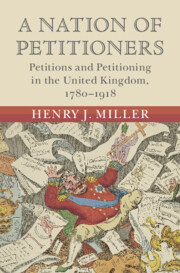Book contents
- A Nation of Petitioners
- Modern British Histories
- A Nation of Petitioners
- Copyright page
- Dedication
- Contents
- Figures
- Tables
- Acknowledgements
- Abbreviations
- Introduction
- Part I Petitions
- Part II Petitioners
- Part III Petitioning
- 7 The Practice of Petitioning
- 8 Mass Petitioning
- 9 Petitioning and Representation
- 10 Petitioning and Political Culture in an Age of Democratisation
- Conclusion
- Select Bibliography
- Index
8 - Mass Petitioning
from Part III - Petitioning
Published online by Cambridge University Press: 02 February 2023
- A Nation of Petitioners
- Modern British Histories
- A Nation of Petitioners
- Copyright page
- Dedication
- Contents
- Figures
- Tables
- Acknowledgements
- Abbreviations
- Introduction
- Part I Petitions
- Part II Petitioners
- Part III Petitioning
- 7 The Practice of Petitioning
- 8 Mass Petitioning
- 9 Petitioning and Representation
- 10 Petitioning and Political Culture in an Age of Democratisation
- Conclusion
- Select Bibliography
- Index
Summary
Why did people petition and why did they continue to do so when petitions were rarely successful in securing immediate change? The point of petitioning was extensively discussed within nineteenth-century political and social movements. Critics questioned the wisdom of petitioning and argued in favour of electioneering or more direct forms of protest. Tellingly, however, many of these alternatives were either petitions by another name or were facilitated by subscriptional activity. Even if they were ignored or rejected by authorities, petitions were indispensable to political campaigns and social movements, including Chartism, anti-slavery, women’s suffrage, anti-Catholics, and the Anti-Corn Law League, for a variety of reasons. This explains why so many Victorian activists were indefatigable petitioners. Petitioning was the key method for mobilising popular support and pressuring Parliament; an important way of recruiting activists and developing formal political organisation, at both national and local level; raising public awareness and political consciousness; and finally, for forging valuable networks with elite politicians. Petitioning thus underpinned and made possible a broader repertoire of modern campaigning.
Keywords
- Type
- Chapter
- Information
- A Nation of PetitionersPetitions and Petitioning in the United Kingdom, 1780–1918, pp. 203 - 228Publisher: Cambridge University PressPrint publication year: 2023



